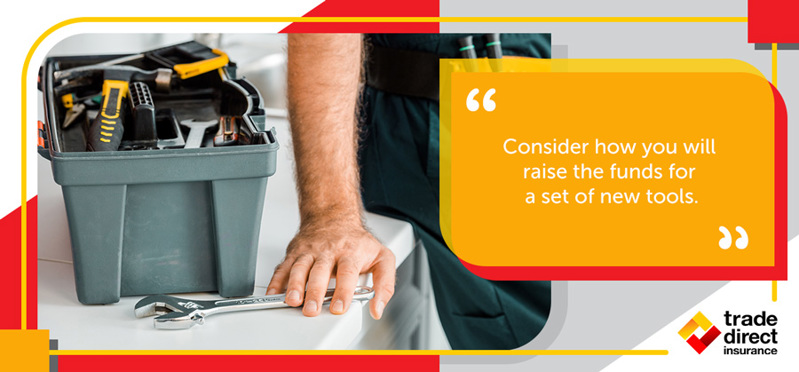
How to start a plumbing business
09 August 2023A successful plumbing business can be both lucrative and rewarding. There is always a strong demand for plumbers, whether you choose to work on small domestic jobs or larger commercial projects.
If you’re thinking of becoming a plumber, here’s a summary of some essential points to consider.
Plumbing qualifications
There are various ways to qualify as a plumber. These include completing a qualification such as a T-level, an NVQ or Level 2 or 3 diploma, or applying for an apprenticeship. You will require certain GCSEs for these options.
Alternatively, you can sometimes apply for a job as a plumber's assistant and do your training on the job.
Even with vocational qualifications, you may still need to complete an apprenticeship before you are ready to start your own business. However, if you’re already a qualified plumber and have been working for some time, it will be much quicker to start up on your own.

Setting up your business
You will need to decide how you want to operate as a business. Your three main options are to operate as either:
- a sole trader
- a limited company
- a partnership.
Each option has pros and cons. For example, a limited company may be slightly more expensive to set up. You will also need to comply with various ongoing legal requirements.
A limited company also comes with limited liability: should something go wrong, the business owner is only responsible for debts up to the value of their financial investment in the business. This means a creditor can only take assets or finances belonging to the company, not personal assets. If you operate as a sole trader this is not the case because limited liability does not apply. While setting up a sole trader business is easier, your personal assets could be at risk if something goes wrong and you’re uninsured.
If you’re not sure which is the best option, you should consider getting some professional advice.
Register for tax
However you choose to set up your business, you will need to register with HMRC for tax purposes.
If you set up as a limited company, you will normally register for corporation tax at the same time as registering with Companies House.
If you decide to operate as a sole trader or partnership, you will need to register for Self-Assessment with HM Revenue and Customs.

Equipment and finance
If you are running your own plumbing business, you will need your own equipment. Therefore, you may need to think about how you are going to fund any purchases.
You may have the money to get started with a few essential tools, or you may need to apply for finance. If the latter is true, make sure you choose a respectable finance company with experience of working with small businesses and trades.
Professional memberships
You should consider joining a professional body, such as the Chartered Institute of Plumbing and Heating Engineers (CIPHE). They will usually have certain requirements you must comply with. You will probably be vetted to ensure you have the necessary skills and commitment to high standards.
They may also require you to be insured.
Being able to show potential clients that you are a member can reassure them regarding the quality of your services and be a powerful marketing tool.
Sales and marketing
You will need a plan for attracting clients. Apart from your business name and contact details, you may want:
- business cards
- a website
- a social media page
- a presence on various ‘find a trader’ platforms, like Checkatrade.

Getting insured
Plumbers’ insurance is an essential consideration for any plumbing business. There are various types of insurance you may need. These include:
- public liability
- employers’ liability insurance
- professional indemnity insurance
- insurance for your tools.
Public liability insurance protects you in the event something your business does causes damage to property or injury to someone.
You are legally required to have employers’ liability insurance if you employ anyone, including an apprentice, trainee, or even a friend working for free.
Professional indemnity insurance relates to any advice you give as part of your work, such as design or specifications.
Tools insurance relates to your tools in the event they are ever lost, stolen or damaged.
Again, choosing an insurance company which has construction industry experience is advisable because they will understand the risks tradespeople face.
Finding the right insurance company
Trade Direct Insurance is a leading specialist in the provision of insurance for tradespeople, including plumbers. We have 40 years of experience and are committed to helping our clients find the right insurance policies for your business.
We believe in providing a personal service, which extends to offering round-the-clock access to our online claims platform.
Our team is also on hand to provide insurance for your plumbing business and discuss your insurance requirements. Whether it’s about a quote, or just general advice, we’re always happy to help.
You can contact us by sending an email, or giving us a call on 0800 0280 380.
Trade Direct is authorised and regulated by the Financial Conduct Authority. The company is a leading UK independent broker providing a wide range of policies to tradesmen and construction workers.
This note is not intended to give legal or financial advice, and, accordingly, it should not be relied upon for such or regarded as a comprehensive statement of the law and/or market practice in this area. In preparing this note we have relied on information sourced from third parties and we make no claims as to the completeness or accuracy of the information contained herein. You should not act upon information in this bulletin nor determine not to act, without first seeking specific legal and/or specialist advice. We and our officers, employees or agents shall not be responsible for any loss whatsoever arising from the recipient’s reliance upon any information we provide herein and exclude liability for the content to fullest extent permitted by law.
